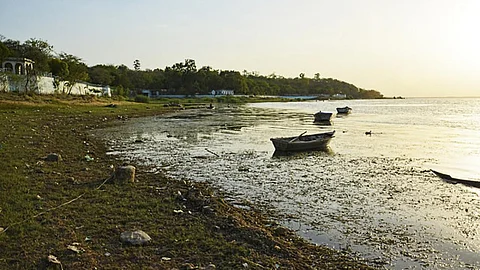
- Topics
- Feature
- Opportunities & Events
- Data
- Hindi Portal
- Topics
- Feature
- Opportunities & Events
- Data
- Hindi Portal

With an aim to bring in greater efficiency, better planning and increased emphasis on water conservation, the Government is planning to restructure the organisations managing water resources in the country. The Centre is making plans to set up a National Water Commission in place of the Central Water Commission (CWC) and the Central Ground Water Board (CGWB). Per the Authorities, such restructuring will ensure that the country's water resources are managed in a holistic manner rather than as they are currently--surface water, ground water or river water separately.
The Power Ministry has appointed a 10-member Committee for drafting a new hydropower policy that will help in the revival of stalled hydel projects and attract fresh investments into the sector. More than a dozen hydroelectric power projects have been delayed and are facing cost overruns due to delays in environment and forest clearances, inter-state water-sharing disputes, technical and geological uncertainties and difficulties in securing financing. The panel has also been asked to give its report by the first week of April and suggest policy measures on technical, financial, environmental and commercial aspects.
The Uttar Pradesh Government has earmarked over Rs 1,400 crore in its 2016-17 annual budget for various projects in the water-scarce Bundelkhand region. The State Government has reserved Rs 200 crore for making special arrangements for potable water and another Rs 500 crore has been proposed for a surface source-based rural potable water project. Also, a provision of Rs 150 crore has been set aside for the multi-purpose irrigation project on the Betwa river in Jhansi. The UP Government has also requested the Centre to include the entire population of Bundelkhand under the Food Security Act.
The Environment Ministry has refused clearance to the city's biggest wastewater treatment plant proposed near Malad creek along the western coast. The plant, which would have the potential to recycle and reuse up to 847 million litres of sewage daily, has been denied on the grounds of violations to the Coastal Regulation Zone Notification, 2011. Along with this, the proposed plant would also involve the large scale uprooting of mangroves.
The Tamil Nadu Chief Minister has announced Amma drinking water scheme (Amma Kudineer Thittam) for the economically weaker sections of Chennai. Under the scheme, 20 litres per day of treated water from reverse osmosis purifiers will be provided to every poor family in the city, free of cost. The scheme will initiate from the Greater Chennai Corporation where 100 identified habitations will be provided with purified drinking water.
This is a roundup of important policy matters from February 9 - 15, 2016. Also read last week's news roundup.